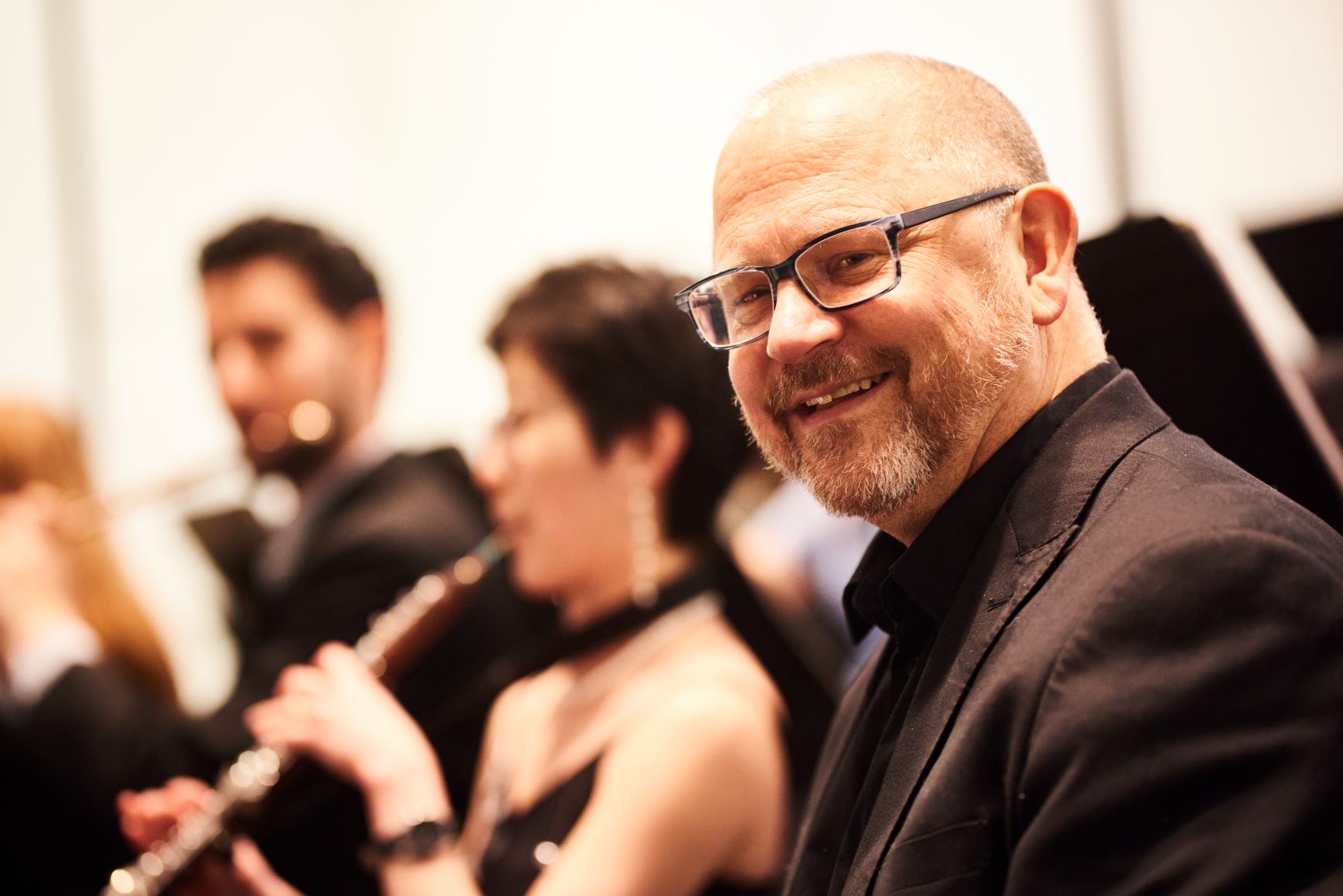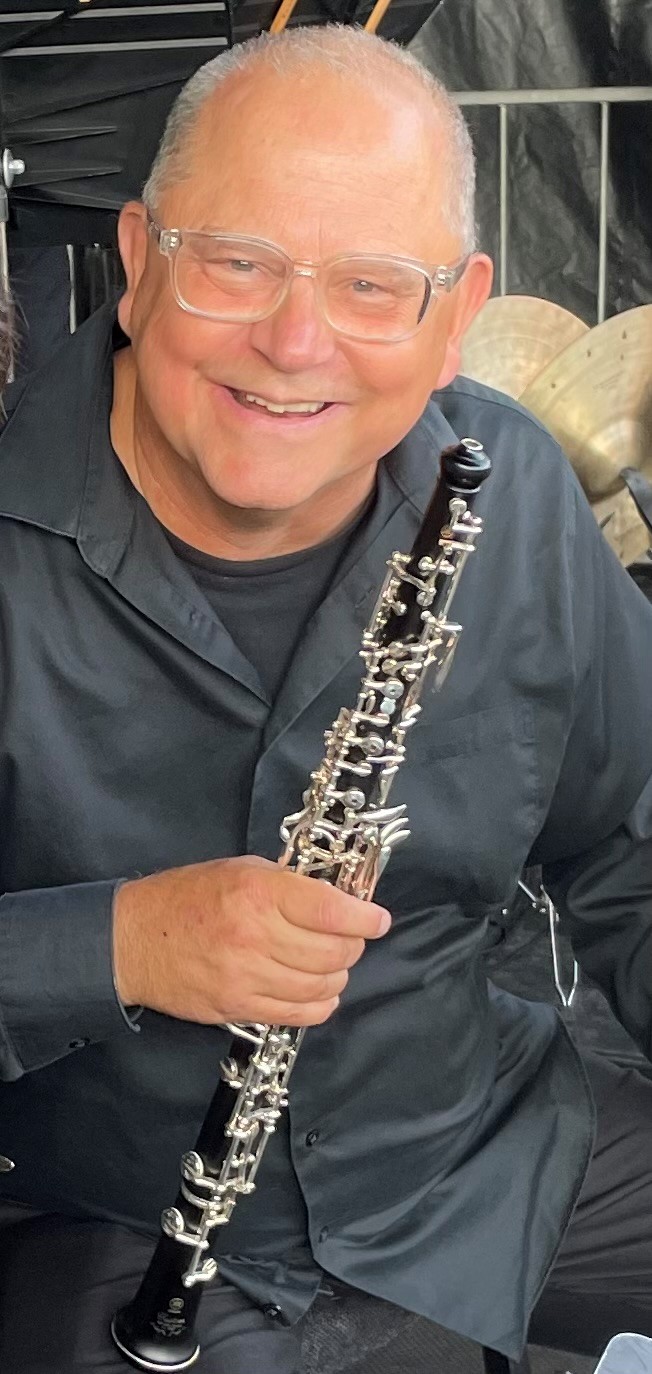Shaping Sound: Russell Bajer & 31 Years with the VS
by Rebecca Marchand
Russell Bajer, oboe
When the Instrument Chooses You
“The oboe chooses its players.” That’s how long time Victoria Symphony musician Russell Bajer describes his first encounter with the instrument that would define his life. At fourteen, he heard the oboe live for the very first time and felt an almost out-of-body experience. It was, he says, less a conscious decision than a calling: “Those who stick with the oboe, considering everything it demands, are the ones called to it.”
For Russell, that moment of recognition set him on a path that would eventually bring him to the Victoria Symphony. His path to Victoria wasn’t simple or guaranteed. After studying music, Russell balanced freelancing in Vancouver with work outside the arts, including many years supporting children with autism in group homes. Gradually, his freelance career grew, with opportunities to perform with the Vancouver Opera, CBC Orchestra, and Vancouver Symphony. When an opening for second oboe arose in Victoria in 1994, he auditioned behind a screen in a series of tie-breaking rounds. “By the third or fourth time, I was frustrated,” he recalls. “But I put that into the instrument, added a little fire, and that’s how I won the job.”
Thirty-one years later, he is still following where the oboe—and its cousin, the English horn—leads. Audiences may know him for the soulful, expressive sounds that rise from the woodwind section, but behind each note is a lifetime of dedication, craftsmanship, and heart.
The Art (and Craft) of the Reed
Playing the oboe, or its cousin the English horn, is not just about musicianship. It’s also about craftsmanship. Unlike most musicians, oboists must make their own reeds, a meticulous process that Russell describes as “90% of the instrument.” Each reed is handmade, fragile, and short-lived, meaning hours of work often vanish with a crack or a scrape too far.
For the oboe, the reed is small, delicate, and wears out quickly—the tip is thinner than paper and endures constant vibrations and tongue strikes during performance. The English horn, by contrast, uses a larger reed that fits over a slender metal tube called a bocal. It’s freer-blowing and produces the mellow, plaintive voice that has made the instrument so beloved. Russell spends countless hours shaping and tuning reeds for both instruments, always adjusting for the demands of a particular piece.
For instance, while preparing for Sibelius’ The Swan of Tuonela, he’s been discarding reeds that can’t handle the wide dynamic range of the solo: “I need something loud enough to project over the strings, but soft enough to let the swan glide,” he explains.
It’s painstaking, almost meditative work and Russell sees himself as much a craftsman as a musician. “It’s like painting,” he says. “One little change can make it better or it can ruin it entirely.” Knowing how discouraging playing with a bad reed can be, he makes sure his students begin with reeds that set them up for success in developing their love of the instrument. “With the oboe, a poor reed can make a beginner sound as painful as a beginning violinist,” he laughs. “I don’t want that for them.”
A Swan Takes Flight
This season, Russell took center stage performing in The Swan of Tuonela, a work he has been advocating to perform for many years. In this year’s eighty-fifth anniversary season, the piece has finally found its place on the program. The English horn solo, achingly beautiful and deeply expressive, tells a story from Finnish mythology of a mystical swan gliding through the land of the dead.
For Russell, it is both a professional highlight and a personal milestone: “My goal is simple—if people feel like a story has been told, then I’ve done my job.”
Preparing for such a featured moment is demanding. The piece requires long, lyrical phrases that stretch a musician’s breath control to the limit. Russell jokes about his most important challenge: “The last thing I want is to look like a dying swan up there, we want it to survive!” But he knows he won’t be alone. His colleagues in the orchestra and the woodwinds section, whom he describes as his “family within the family,” will be listening with warm hearts. “I’ve always felt supported here. Our orchestra really wants people to succeed, and that’s a wonderful thing.”
And for audiences and fellow musicians alike, there’s something especially moving about seeing a long time member of the orchestra step forward into the spotlight, transforming from a section player into a storyteller whose voice carries the whole hall.
What many people don’t realize, Russell adds, is just how much music the musicians prepare in a single season. Week after week, the repertoire shifts, from cornerstone symphonies by Dvořák and Beethoven to modern works by living composers, holiday classics, movie music, and more. “By the time November rolls around, the cumulative fatigue really sets in” he shares, breathless just thinking about it. “But it’s also incredible when you stop and think about the variety, artistry, and the sheer breadth of what we get to play.”
Beyond the Stage
Russell’s passion for music doesn’t stop at the stage. He teaches students of all ages in his home studio, his oldest is 86, his youngest just 10 years old. His studio is part workshop, part classroom, with a fish tank to captivate younger learners and tools for reed making that show the craft behind the sound.
Outside of music, Russell is a devoted traveler. Recently he began learning Spanish after a trip to Costa Rica, determined to make future adventures through Central and South America even more rewarding. He and his partner also love exploring closer to home, hiking Vancouver Island’s trails with their tireless canine companion.
The Heart of an Orchestra
Looking back on his 31 years with the Symphony, Russell is proud of how far the orchestra has come, and grateful for the joy it brings both audiences and musicians alike.
He has watched the orchestra grow stronger and more vibrant, through retirements and fresh arrivals, all while holding to a spirit of warmth and support that he says makes the Victoria Symphony one of the friendliest orchestras in Canada.
For Russell, the greatest reward comes not from applause but from the quiet words of audience members after a performance: “Wow that was amazing. It really moved us.” That, he says, is what makes it all worthwhile. “If I can give someone goosebumps when I play, I’ll be happy.”





Thanks for the story about Russell Bajer. I’ve had a thing for the oboe ever since my early twenties, when a special boyfriend decided it was the instrument he wanted to learn to play. I discovered the enchanting, mellow sound of the oboe and have loved it ever since. (But not the boyfriend.)
I was at the concert, where Russell’s English horn solo was the highlight for me.